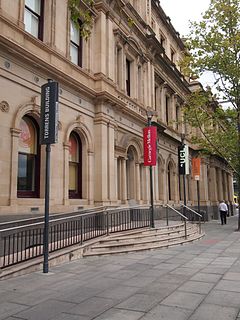Torrens Building
| Torrens Building | |
|---|---|
 |
|
| Former names | Government Offices |
| General information | |
| Type | Office, Education |
| Architectural style | Renaissance Palladian |
| Location | Adelaide, Australia |
| Address | 220 Victoria Square (Tarndanyangga) |
| Construction started | 1879 |
| Completed | 8 April 1881 |
| Renovated | 1995 |
| Cost | approx. £60,000 |
| Owner | Government of South Australia |
| Technical details | |
| Floor area | 3,653sqm |
| Design and construction | |
| Architect | Michael Egan (Melbourne) |
| Main contractor | James Shaw |
The Torrens Building, named after Sir Robert Richard Torrens, is a State Heritage listed building on the corner of Victoria Square and Wakefield Street in Adelaide, South Australia. Originally known as the Government Offices, the Torrens Building has been home to a number of government departments for most of its existence. Since 2005, it been the site of the University City Adelaide precinct, housing campuses of Carnegie Mellon University, Cranfield University, University College London and Torrens University.
The building created some controversy in 1880 when it was reported that the Government of South Australia was going to import freestone for construction from Sydney, rather than use stone from local quarries.
In 2015, the Torrens Building was offered for sale as part of the State Administration Centre precinct by the Government of South Australia, previously having been excluded from the sale plans.
Between 1991 and 1995, major refurbishment of the Torrens Building was undertaken. Once completed, the building was used to accommodate a number of community groups and organisations including:
Following renovation, the building was reopened by then Premier of South Australia, John Olsen, on 19 September 1997.
A plaque on the Western wall exterior commemorates the centenary of the Real Property Act 1858, which provides for the Torrens Title system, developed in South Australia and adopted around the world. The plaque was unveiled on 1 July 1958 by then Lieutenant Governor of South Australia, Sir Mellis Napier.
...
Wikipedia
